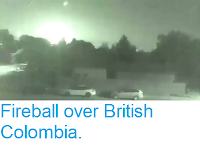Many witnesses in Russia and Finland have reported a bright fireball meteor on the evening of Tuesday 12 September 2017. The object was seen at about 8.15 pm local time, from southeastern Finland, and the Saint Petersburg, Smolensk, Novgorod and Moscow Oblasts (states) of Russia, though it was apparently over St Petersburg. Based upon data from a number of observatories in Russia and Finland, Viktor Grokhovsky of the Ural Federal University has estimated that the object was at most a meter across and a ton in mass. An object of this
size would be expected to explode in
an airburst (an explosion caused by superheating from friction with the
Earth's atmosphere, which is greater than that caused by simply
falling, due to the orbital momentum of the asteroid) in the atmosphere
more than 50 km above the ground, with only fragmentary material
reaching the Earth's surface, though there is a possibility that some material from this meteorite has fallen in the Lake Seliger area Tver Oblast.
A fireball
is defined
as a meteor
(shooting star) brighter than the
planet Venus. These are typically caused by pieces of rock burning up in
the atmosphere, but can be the result of man-made space-junk burning up
on re-entry.
Objects
of this size probably enter the Earth's atmosphere several times a
year, though unless they do so over populated areas they are unlikely to
be noticed. They are officially described as fireballs if they produce a
light brighter than the planet Venus. It is possible, though unlikely,
that this object will have produced meteorites that reached the surface
(an object visible in the sky is a meteor, a rock that falls from the
sky and can be physically held and examined is a meteorite), though most
meteorites come from larger objects that penetrate further into the
atmosphere before exploding, and therefore have a better chance of
producing fragments that reach the surface.
See also...
Follow Sciency Thoughts on Facebook.







